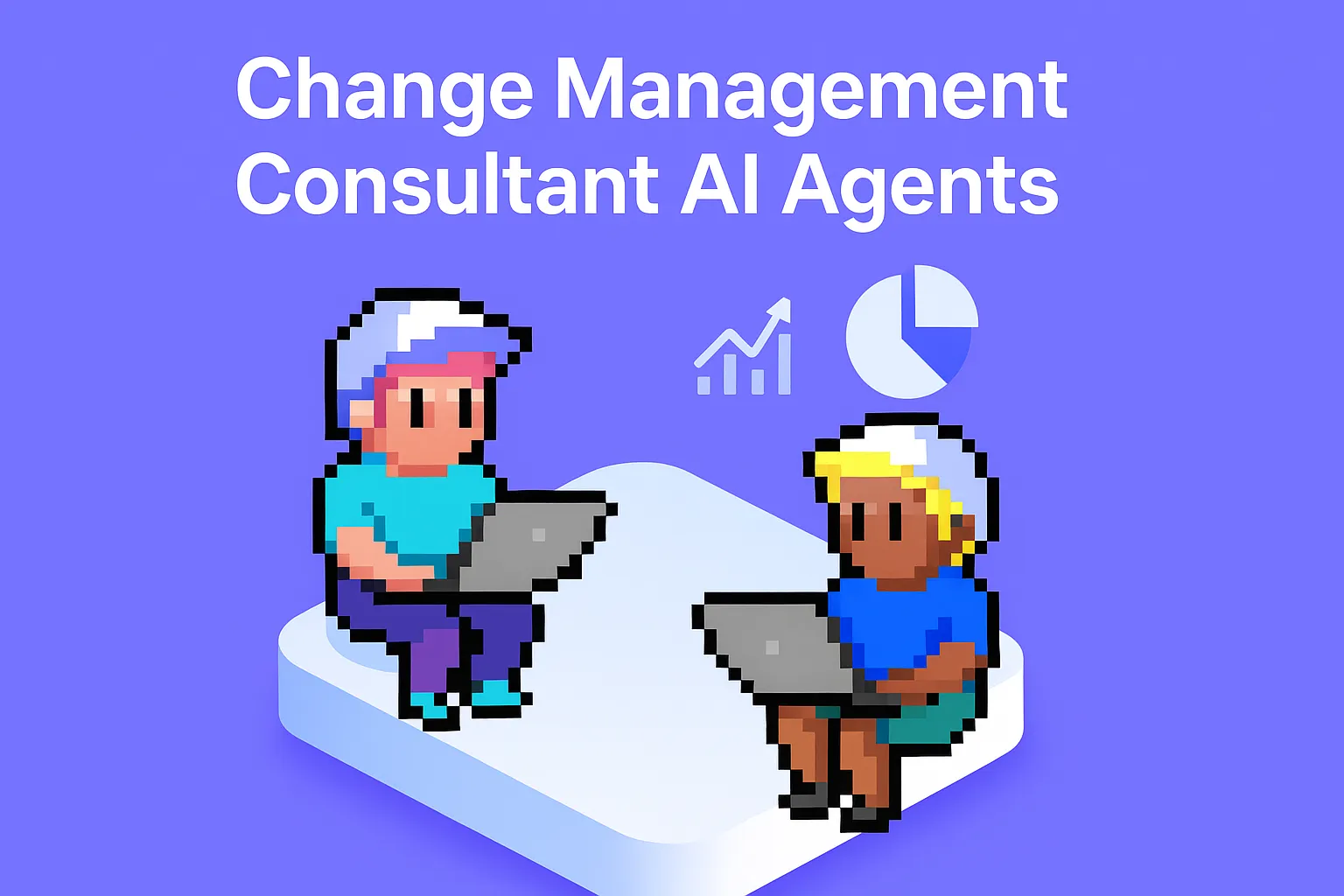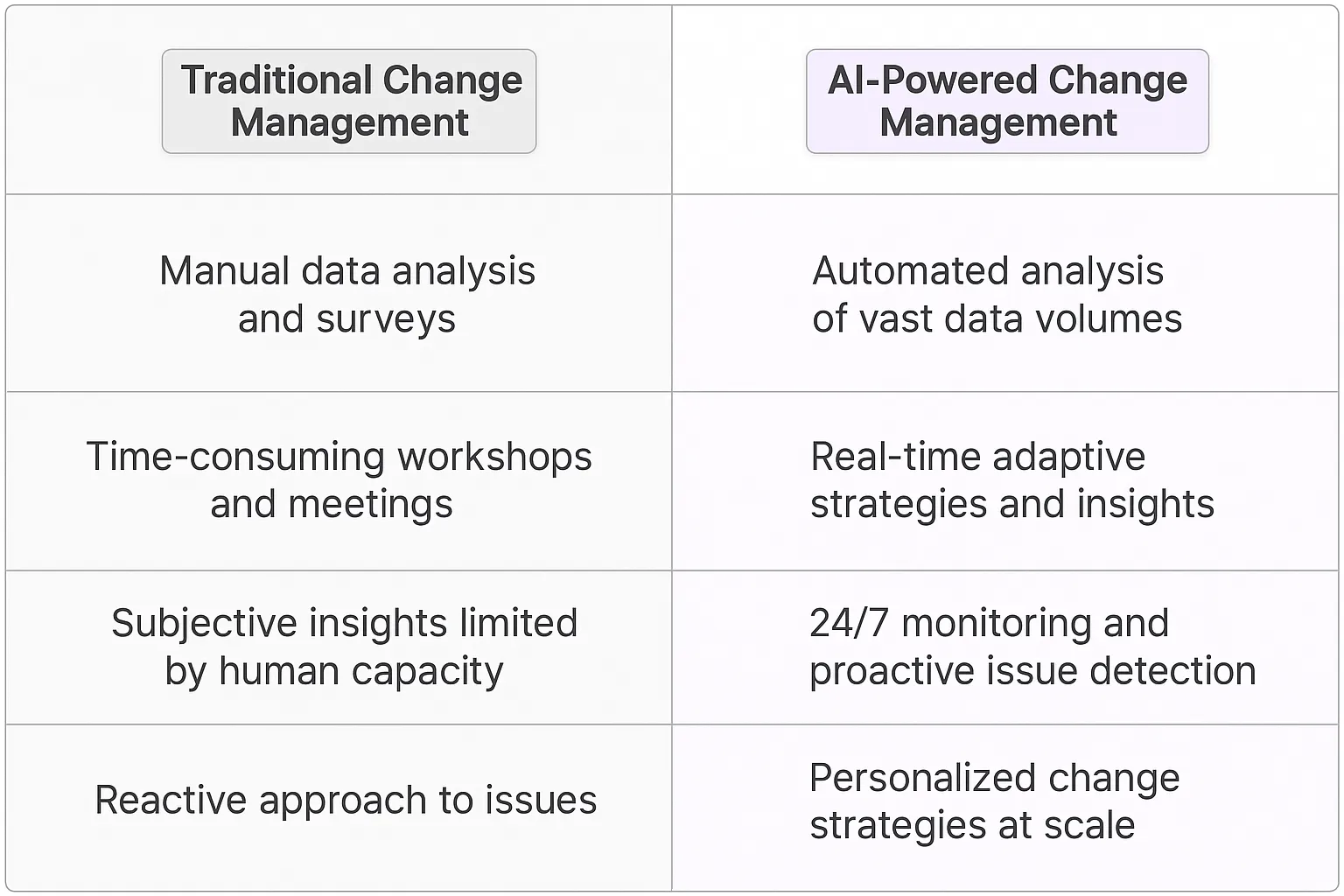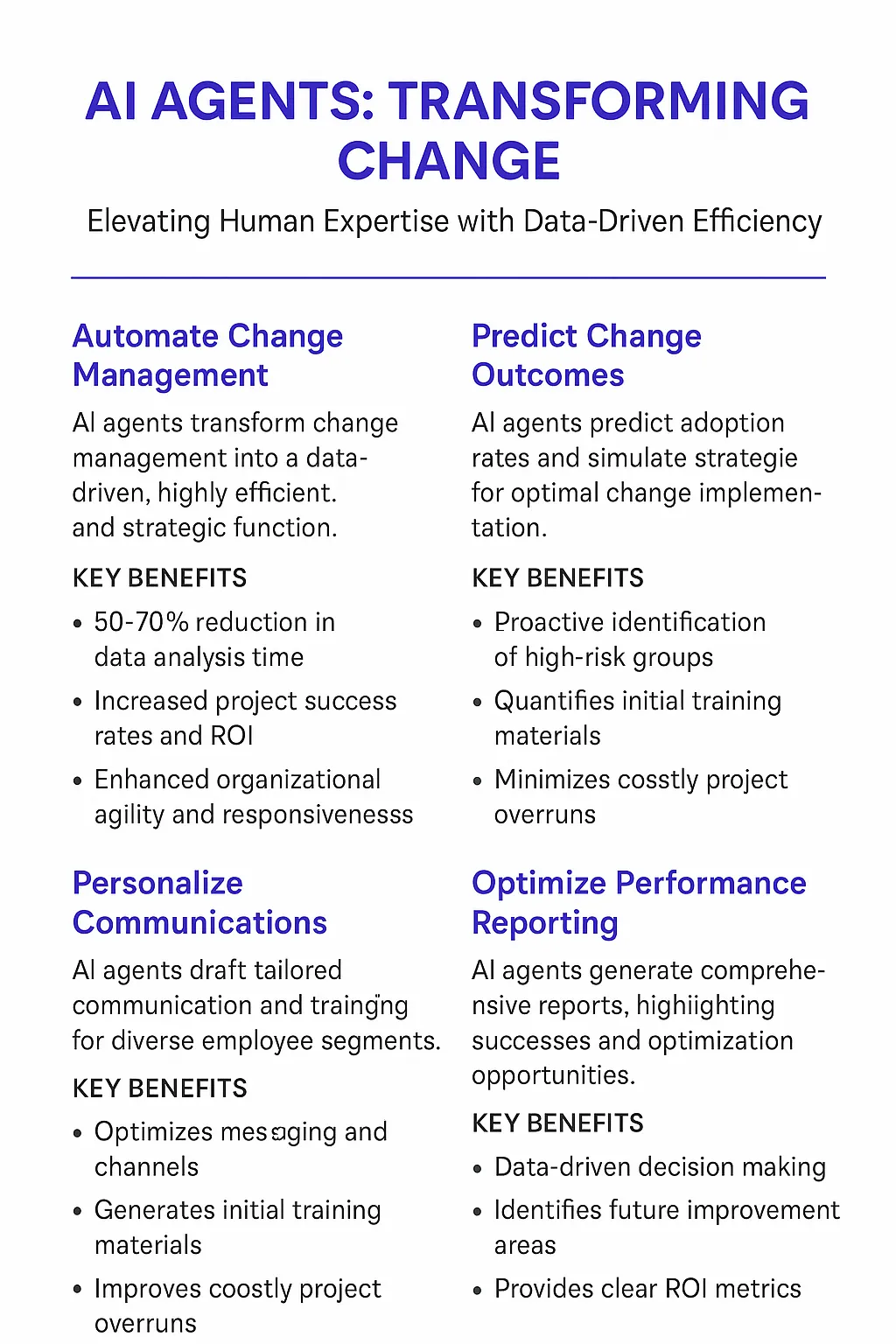Change Management Consultant is a cutting-edge software solution that integrates AI agents into the traditional change management process. It's designed to augment human consultants' capabilities by providing data-driven insights, predictive analytics, and adaptive strategies. This digital teammate works alongside human experts to navigate the complex landscape of organizational transformation, offering a powerful blend of machine intelligence and human expertise.
Change Management Consultant boasts several game-changing features:1. Advanced data analysis: Processes vast amounts of structured and unstructured data to uncover hidden patterns and insights.2. Real-time adaptation: Continuously updates strategies based on new information and changing organizational dynamics.3. Personalization at scale: Tailors communication and change strategies for different segments of the organization.4. 24/7 monitoring: Constantly tracks progress, flags potential issues, and identifies optimization opportunities.5. AI-powered scenario planning: Generates and evaluates multiple change scenarios with potential outcomes and risk assessments.6. Automated task handling: Takes care of time-consuming tasks like drafting communication plans and designing training modules.

Before AI agents entered the scene, change management consultants relied heavily on traditional tools and methodologies. They'd spend countless hours poring over spreadsheets, conducting manual surveys, and facilitating workshops to gather insights. The process was time-consuming, often subjective, and limited by human cognitive capacity.
Consultants would use project management software, data visualization tools, and communication platforms to coordinate efforts. But these tools, while useful, lacked the ability to process vast amounts of unstructured data or provide real-time, adaptive insights. The result? Change initiatives that sometimes missed the mark or failed to fully address the complex, dynamic nature of organizational change.
Enter AI agents - the game-changers in the world of change management. These digital teammates are transforming how consultants approach organizational change, offering benefits that were previously unimaginable.
First off, AI agents excel at data analysis on steroids. They can process enormous volumes of structured and unstructured data from various sources - employee feedback, market trends, internal communications - and extract meaningful patterns and insights. This capability allows consultants to make data-driven decisions with unprecedented accuracy and speed.
But it's not just about crunching numbers. AI agents bring a level of adaptability and learning that's crucial in the ever-shifting landscape of organizational change. They can continuously update their models based on new information, ensuring that change strategies remain relevant and effective throughout the implementation process.
Another killer feature? Personalization at scale. AI agents can tailor communication and change strategies for different segments of the organization, addressing individual concerns and resistance points. This level of customization was simply not feasible with traditional methods.
Moreover, AI agents are tireless workers. They can monitor the progress of change initiatives 24/7, flagging potential issues before they become problems and identifying opportunities for optimization. This constant vigilance allows consultants to be proactive rather than reactive in their approach.
Perhaps most importantly, AI agents free up consultants to focus on what they do best - providing strategic guidance, building relationships, and navigating the complex human elements of change. By handling the heavy lifting of data analysis and routine tasks, AI agents elevate the role of consultants from number-crunchers to true strategic partners.
In essence, AI agents are not just tools; they're force multipliers. They're expanding the boundaries of what's possible in change management, enabling consultants to drive more successful, impactful, and sustainable organizational transformations. And we're just scratching the surface of their potential. As these digital teammates continue to evolve, they'll undoubtedly reshape the entire landscape of change management consulting.

Change management consultants often find themselves juggling multiple complex processes simultaneously. AI agents can be game-changers in this space, offering support that goes beyond simple task automation. These digital teammates can help consultants navigate the intricate web of organizational change with greater precision and insight.
For instance, an AI agent could analyze vast amounts of employee feedback data, identifying patterns and sentiment trends that might escape human observation. This deep dive into organizational pulse can inform the consultant's strategy, allowing for more targeted and effective interventions.
Another process where AI shines is in scenario planning. By leveraging historical data and current organizational metrics, an AI agent can generate multiple change scenarios, complete with potential outcomes and risk assessments. This empowers consultants to present clients with data-driven options, enhancing their decision-making process.
On a more granular level, AI agents can tackle specific tasks that traditionally eat up a consultant's valuable time. Think about the hours spent crafting communication plans or designing training modules. An AI agent can draft these materials in a fraction of the time, allowing consultants to focus on high-level strategy and client interaction.
Change readiness assessments, often a time-consuming task, can be streamlined with AI. By analyzing organizational data, employee surveys, and industry benchmarks, an AI agent can provide a comprehensive readiness report, highlighting areas of strength and potential resistance.
Moreover, AI agents can act as always-on support for employees navigating the change. They can answer FAQs, provide resources, and even offer personalized guidance based on an individual's role and concerns. This 24/7 support system can significantly reduce the consultant's workload while improving the overall change experience for employees.
The potential of AI in change management is vast. As these digital teammates evolve, they'll likely become indispensable partners for consultants, enhancing their ability to guide organizations through complex transformations with greater efficiency and effectiveness.

AI agents are reshaping the landscape of change management consulting, offering a powerful blend of data-driven insights and adaptive strategies. These digital teammates are proving invaluable across various sectors, each with its unique challenges and opportunities. Let's dive into some specific industry use cases that highlight how AI is transforming change management processes and outcomes.
From healthcare to finance, manufacturing to tech startups, AI agents are becoming indispensable partners for change management consultants. They're not just crunching numbers faster; they're uncovering hidden patterns, predicting resistance points, and even suggesting tailored communication strategies. This isn't about replacing human expertise – it's about amplifying it to unprecedented levels.
In the following examples, we'll explore how AI agents are tackling real-world change management challenges, providing consultants with a competitive edge and organizations with smoother, more successful transformations. Get ready to see how these digital powerhouses are redefining what's possible in the realm of organizational change.
The retail industry is ripe for disruption, and Change Management Consultant AI agents are leading the charge. These digital teammates are transforming how brick-and-mortar stores adapt to the e-commerce era.
Take a major department store chain facing declining foot traffic. Traditionally, they'd hire a team of consultants, burn through months of analysis, and implement changes at a glacial pace. Enter the AI-powered change management consultant.
This digital teammate ingests vast amounts of data - from sales figures to customer feedback, employee performance to inventory turnover. It then crafts a tailored transformation strategy in days, not months. The AI doesn't just regurgitate best practices; it creates novel solutions by combining insights from diverse industries.
For example, it might suggest transforming certain store sections into experiential spaces, drawing inspiration from successful museum exhibitions. It could propose a dynamic pricing model based on real-time foot traffic, similar to surge pricing in ride-sharing apps.
But the real magic happens during implementation. The AI continuously monitors key performance indicators, adjusting the strategy on the fly. It identifies resistance points among staff and customers, recommending targeted interventions. Maybe it notices that Gen Z customers are particularly resistant to a new store layout. The AI might suggest a TikTok campaign explaining the changes, tapping into the virality mechanics of social media.
This isn't just faster or cheaper than traditional consulting - it's a fundamentally different approach. The AI's ability to process vast amounts of data analysis, generate creative solutions, and adapt in real-time creates a living, breathing change management process. It's like having a world-class consultant working 24/7, constantly refining and improving the strategy.
The result? A retail chain that doesn't just survive the e-commerce onslaught but thrives in it, turning physical stores into assets rather than liabilities. That's the power of Change Management Consultant AI in retail - not just adapting to change, but mastering it.
The manufacturing sector is undergoing a seismic shift, and Change Management Consultant AI agents are at the forefront of this transformation. These digital teammates are redefining how factories adapt to the era of Industry 4.0 and smart manufacturing.
Consider a legacy automotive parts manufacturer struggling to keep pace with the electric vehicle revolution. Traditionally, they'd hire a team of consultants, spend months on analysis, and implement changes at a snail's pace. Enter the AI-powered change management consultant.
This digital teammate devours data from every corner of the operation - production metrics, supply chain logistics, workforce productivity, and market trends. It then crafts a bespoke transformation strategy in a fraction of the time it would take a human team. But here's where it gets interesting: the AI doesn't just rehash industry best practices. It creates innovative solutions by cross-pollinating ideas from seemingly unrelated fields.
For instance, it might propose reorganizing the factory floor using principles borrowed from urban planning, optimizing workflow like a well-designed city. Or it could suggest implementing a predictive maintenance system inspired by how social networks forecast viral content trends.
The real game-changer, though, is during implementation. The AI constantly monitors a myriad of performance indicators, tweaking the strategy in real-time. It identifies friction points among workers and in processes, recommending targeted interventions. Say it notices that the night shift is struggling with new automated systems. The AI might propose gamifying the training process, drawing inspiration from mobile game design to boost engagement and mastery.
This approach isn't just faster or more cost-effective than traditional consulting - it's a paradigm shift. The AI's capacity to process vast datasets, generate creative solutions, and adapt on the fly creates a dynamic, evolving change management process. It's like having a team of world-class consultants working round the clock, continuously refining and improving the strategy.
The outcome? A manufacturing operation that doesn't just survive the Industry 4.0 transition but leads it, turning potential disruptions into competitive advantages. That's the true power of Change Management Consultant AI in manufacturing - not just managing change, but weaponizing it for growth.
Implementing a Change Management Consultant AI Agent isn't just about plugging in some code and watching the magic happen. It's a complex dance of algorithms, data, and human interaction. First off, you're dealing with the challenge of natural language processing. Your digital teammate needs to understand the nuances of human communication, from the formal jargon of corporate memos to the casual banter of water cooler conversations.
Then there's the issue of data integration. Your AI agent needs to tap into a vast array of company data - HR records, project management software, financial systems - you name it. But here's the kicker: this data is often siloed, inconsistent, and in formats that would make even the most seasoned data scientist break out in a cold sweat.
And let's not forget about the ever-present specter of bias. Your AI is learning from historical data, which means it's inheriting all the biases and mistakes of the past. Ensuring fairness and equity in its recommendations is a technical challenge that keeps many an engineer up at night.
On the operational side, you're essentially introducing a new team member - one that never sleeps, never takes a coffee break, and can process information at superhuman speeds. Sounds great, right? Well, not so fast. Your human team needs to learn how to work with this digital powerhouse, and that's no small feat.
There's also the question of authority and decision-making. How much power do you give your AI agent? Can it make decisions on its own, or does it need human oversight? These are questions that can fundamentally reshape your organizational structure and processes.
Then there's the elephant in the room: resistance to change. Ironically, your change management AI might face the stiffest resistance from the very people it's meant to help. Employees might fear job displacement, managers might feel threatened, and executives might question the ROI. Overcoming this resistance requires a delicate balance of education, reassurance, and demonstrable results.
Lastly, there's the ongoing challenge of maintenance and improvement. Your AI agent isn't a set-it-and-forget-it solution. It needs constant feeding of new data, tweaking of algorithms, and adaptation to changing business needs. This requires a dedicated team and a commitment to continuous improvement that many organizations underestimate.
Implementing a Change Management Consultant AI Agent is a journey, not a destination. It's a path filled with technical hurdles, operational challenges, and the ever-present human factor. But for those who navigate it successfully, the rewards can be transformative.
Change Management Consultant AI Agents are not just a technological upgrade; they're a paradigm shift in how we approach organizational transformation. These digital teammates are redefining the role of change management consultants, elevating them from data crunchers to strategic visionaries. By handling the heavy lifting of data analysis, scenario planning, and routine tasks, AI agents free up human consultants to focus on what they do best - navigating the complex human elements of change and providing high-level strategic guidance.
The potential of these AI agents is vast and still largely untapped. As they continue to evolve, we can expect even more sophisticated capabilities, from predicting resistance points with uncanny accuracy to crafting hyper-personalized change strategies for each individual in an organization. The future of change management lies in the symbiosis between human expertise and AI capabilities.
However, implementing these AI agents isn't without challenges. From technical hurdles like data integration and bias mitigation to operational challenges like employee resistance and continuous maintenance, organizations must be prepared for a journey, not a quick fix. But for those who successfully navigate these challenges, the rewards are transformative - more agile, resilient, and adaptive organizations capable of thriving in an ever-changing business landscape.
As we stand on the brink of this AI-driven revolution in change management, one thing is clear: the consultants and organizations that embrace these digital teammates will have a significant competitive advantage. They'll be able to drive change faster, more effectively, and with greater precision than ever before. The question isn't whether AI will transform change management - it's how quickly you'll adapt to this new reality.